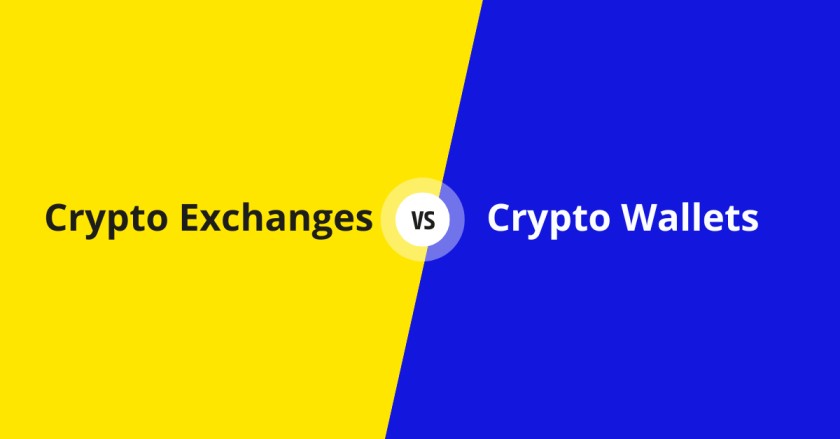If you’ve ever been involved in the cryptocurrency world or done extensive research on how to buy-sell, trade, or invest in cryptocurrency, you’ve probably come across terms like cryptocurrency wallet and exchanges. Despite the fact that the crypto world and the terms used in it are almost limitless. However, it is essential for everyone to understand the fundamentals, especially if you intend to enter the crypto world.
Let us return to the terms Crypto Wallet and Crypto Exchange. Both of these serve as a channel for crypto customers/users to interact with their digital assets or cryptocurrencies. But these are not the same thing; there is a significant difference between a crypto wallet and a crypto exchange.
So, in this article, we will learn the difference between a wallet and an exchange, how they work, and what is recommended by reputable financial institutions.
Let’s get started
Cryptocurrency Exchange :
A cryptocurrency exchange is a website or platform where you can buy, sell, trade, or invest in digital assets or cryptocurrencies. These platforms are specifically designed to exchange digital currencies such as bitcoin, Ethereum, litecoin, dogecoin, and others. The best part is that you can exchange cryptocurrencies using a crypto exchange. For example, you can purchase bitcoin using Ethereum coins. Getting words from here and there is no longer sufficient; you must also understand wallets and exchanges more thoroughly in order to determine which one is best to use.
Any website or digital programme that provides services such as investing, buying-selling, trading, depositing, and withdrawing crypto coins and tokens is considered an exchange platform. You should be aware that cryptocurrency exchanges (websites) have wallets where users can store their coins and transact. Simply sign in to your exchange account to access your wallet on crypto exchange platforms. The market rate or value of crypto exchanges fluctuates in the same way that the stock exchange does.
How Do Crypto Exchanges Work?
Crypto exchanges are classified into two types: centralised exchanges and decentralised exchanges (DEX). The vast majority of the largest exchanges are centralised. Binance, Kraken, Coinbase, KuCoin, and Crypto.com are among the most popular exchanges. A centralised exchange has a single entity that makes a market for buyers and sellers and keeps an order book with user bids (buy orders) and asks (sell orders).
Many exchanges let users place a “market” order, which executes a buy or sell at the current market price. The point at which buyers and sellers meet at any given time determines the market price.
Alternatively, traders can place a buy or sell order at a price that is greater than or less than the current market price. When the price falls or rises to the price set by the trader, the order will be filled.
DEXs, on the other hand, do not have a central entity in charge of the order books. Many businesses do not even have order books. An automated market maker is one of the most common methods used by decentralised exchanges (AMM). AMMs automatically match buyers and sellers based on real-time price data from Oracle.
In contrast to centralised exchanges, which must comply with regulations such as anti-money laundering (AML) and know-your-customer (KYC) laws, decentralised exchanges frequently do not require a user to verify their identity. As a result, DEX users can remain more anonymous. They may also be able to use other decentralised finance (DeFi) services, such as borrowing and lending, without having to pass a credit check.
Why would people choose Crypto Exchange?
Crypto exchange is preferred by investors and buyers because it is simple and secure to use. It can also be used for international transactions. It offers the ability to buy, sell, and trade digital assets across multiple computer networks. The best thing about crypto exchange is that it always has a large number of options for its users. As a result, most people consider the crypto exchange to be a digital bank.
Furthermore, exchange platforms provide user information, hot crypto market updates, and portfolios to their users via their websites/applications. Its users can access their wallets simply by completing the sign-in process. There is also a dedicated team available 24/7 to assist cryptocurrency investors, traders, and buyers.
Cryptocurrency Wallet:
A cryptocurrency wallet is a programme that stores cryptocurrency for its users/customers/investors. Investors now have two choices for storing their digital currency: a hot wallet or a cold wallet. Remember that the hot cryptocurrency wallet remains online while the cold cryptocurrency wallet remains offline.
A crypto wallet is made up of two parts: a private key and a public key. The private key functions similarly to the key to a safe deposit box. Anyone who has access to the private key can seize control of all crypto assets stored in a given wallet. Under no circumstances should you share your private key with anyone.
The private key is used to generate the public key, which allows users to receive funds. This key is safe to distribute. When someone wants to receive cryptocurrency, they use their wallet to generate a public key, which they then share with the person sending them the coins.
A single wallet can generate a large number of public keys, also known as addresses. A wallet address can be a QR code or a long string of randomly generated alphanumeric characters.
What makes people prefer cold wallets?
Safety and security
Cryptocurrency wallets are extremely safe to use. All investor data, information, and details are completely secure and encrypted. It means you can privately transact a variety of digital assets or cryptocurrencies using a wallet. And, unless you specify otherwise, no other visitors will be able to see your information.
Simplicity
Crypto wallets are designed in such a way that even the most inexperienced user can store coins in them easily, quickly, and safely. You simply need to sign in the process to receive a unique ID and encrypted password.
Easily accessible
Crypto wallets are easily accessible to anyone with a smartphone/computer and an internet connection. Furthermore, there is no need to follow the taboo of the North-South divide because it is accessible and available to all cryptocurrency enthusiasts.
Storability in crypto wallets
You’d be surprised to learn that you can store your digital assets or cryptocurrencies in crypto-wallets for the long term. While the value of coins can increase or decrease based on market demand, you may encounter price fluctuations on a regular basis.
Less transaction cost
Through crypto-wallets, you can complete the process of depositing/withdrawing or sending/receiving digital currency at a low transaction cost. Not only that, but you can use it to exchange multiple cryptocurrencies. Furthermore, investors/traders can conduct international transactions with lower charges/fees. There are numerous advantages to storing crypto coins and tokens in crypto wallets. Let’s take a look at a cryptocurrency exchange now.
Difference between Exchange and Wallet
Difference in Activity:
A crypto exchange, on the other hand, is a website/platform where one can buy-sell and deposit-withdraw cryptocurrencies. It is also possible to convert fiat currency into digital currency using a crypto exchange.
A cryptocurrency wallet is a programme that only allows investors to store their digital currencies.
Difference in Authority:
When you exchange digital assets, you lose your sole proprietorship. You will also be required to follow exchange regulations.
You have complete control over the use and transfer of your cryptocurrencies while using a wallet. It is entirely up to you to decide when and where to transfer the currencies. It implies that you are the sole owner of your cryptocurrency wallet.
Difference in Feature:
You can sell, buy, or trade your cryptocurrency at any time using a crypto exchange platform.
Some e-commerce features, such as buying, selling, and trading, are not available in a cryptocurrency wallet.
Difference in Dealing Data:
Do not need to be concerned about backing up and securing exchange platforms because this is the responsibility of exchange management.
Dealing with wallet backups, data security, and wallet management can be inconvenient at times.
Which is right for me?
The response to this inquiry is not objective and relies entirely on various factors, such as your level of familiarity with technology, the manner in which you use cryptocurrencies, and your security apprehensions. Moreover, each type and subcategory has distinct features and functions, allowing you to customize your preferences. To provide some guidance, we have designed a few scenarios to help you make a well-informed decision.

Naren is a finance graduate who is passionate about cryptocurrency and blockchain technology. He demonstrates his expertise in these subjects by writing for cryptoetf.in. Thanks to his finance background, he is able to write effectively about cryptocurrency.
